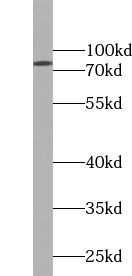Products
FBXW7 antibody
Category:
Research Area:
| Synonyms: | AGO antibody, CDC4 antibody, FBW6 antibody, FBW7 antibody, FBX30 antibody, FBXO30 antibody, FBXW6 antibody, SEL-10 antibody, SEL10 antibody, hAgo antibody, hCdc4 antibody | ||
| Catalogue No.: | FNab03057 | Reactivity: | Human, Mouse, Rat |
| Host: | Rabbit | Tested Application: | ELISA, WB, IHC |
| Clonality: | polyclonal | Isotype: | IgG |
- SPECIFICATIONS
- Product Name
- FBXW7 antibody
- Catalogue No.
- FNab03057
- Size
- 100μg
- Form
- liquid
- Purification
- Immunogen affinity purified
- Purity
- ≥95% as determined by SDS-PAGE
- Clonality
- polyclonal
- Isotype
- IgG
- Storage
- PBS with 0.02% sodium azide and 50% glycerol pH 7.3, -20℃ for 12 months (Avoid repeated freeze / thaw cycles.)
Immunogen
- Immunogen
- F-box and WD repeat domain containing 7
- Alternative Names
- AGO antibody, CDC4 antibody, FBW6 antibody, FBW7 antibody, FBX30 antibody, FBXO30 antibody, FBXW6 antibody, SEL-10 antibody, SEL10 antibody, hAgo antibody, hCdc4 antibody
- UniProt ID
- Q969H0
- Observed MW
- 80 kDa
Application
- Tested Applications
- ELISA, WB, IHC
- Recommended dilution
- WB: 1:500 - 1:2000; IHC: 1:50 - 1:200
Validated Images
 human brain tissue were subjected to SDS PAGE followed by western blot with FNab03057(FBXW7 antibody) at dilution of 1:1000
human brain tissue were subjected to SDS PAGE followed by western blot with FNab03057(FBXW7 antibody) at dilution of 1:1000
 Immunohistochemistry of paraffin-embedded mouse kidney tissue slide using FNab03057( FBXW7 Antibody) at dilution of 1:100
Immunohistochemistry of paraffin-embedded mouse kidney tissue slide using FNab03057( FBXW7 Antibody) at dilution of 1:100
- Background
- This gene encodes a member of the F-box protein family which is characterized by an approximately 40 amino acid motif, the F-box. The F-box proteins constitute one of the four subunits of ubiquitin protein ligase complex called SCFs (SKP1-cullin-F-box), which function in phosphorylation-dependent ubiquitination. The F-box proteins are divided into 3 classes: Fbws containing WD-40 domains, Fbls containing leucine-rich repeats, and Fbxs containing either different protein-protein interaction modules or no recognizable motifs. The protein encoded by this gene was previously referred to as FBX30, and belongs to the Fbws class; in addition to an F-box, this protein contains 7 tandem WD40 repeats. This protein binds directly to cyclin E and probably targets cyclin E for ubiquitin-mediated degradation. Mutations in this gene are detected in ovarian and breast cancer cell lines, implicating the gene's potential role in the pathogenesis of human cancers. Multiple transcript variants encoding different isoforms have been found for this gene.



